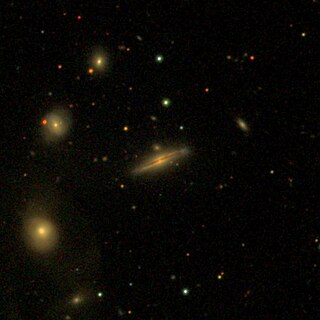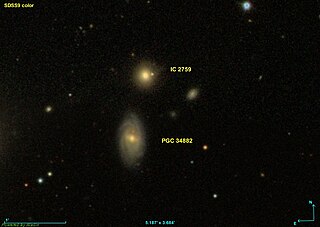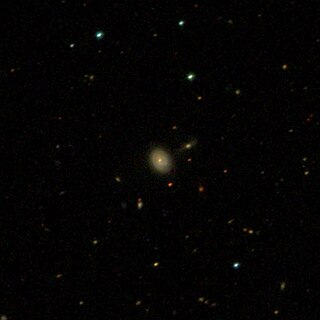
IC 1189 is a S0-a lenticular galaxy with a ring structure located in Hercules. It is located 557 million light-years away from the Solar System and has an approximate diameter of 145,000 light-years. IC 1189 was discovered on June 7, 1888, by Lewis Swift. It is a member of the Hercules Cluster.

IC 1192 is an edge-on barred spiral galaxy located in Hercules. It is located 543 million light-years from the Solar System and has a diameter of approximately 90,000 light-years. IC 1192 was discovered by Stephane Javelle on August 13, 1892. It is a member of the Hercules Cluster.

IC 2759 is a small type E elliptical galaxy located in the constellation of Leo. It is located 350 million light-years away from the Solar System and was discovered on April 24, 1897, by Guillaume Bigourdan. Sometimes IC 2759 is confused with the spiral galaxy, PGC 34882 which is located south of the galaxy.

IC 2816 known as PGC 3472124, is a type Sbc spiral galaxy with a ring structure located in the Leo constellation. It is located 878 million light-years from the Solar System and has apparent dimensions of 0.59 x 0.22 arcmin, meaning its diameter is 160,000 light-years across.

IC 3222 known as PGC 40065 and UGC 7437, is a barred spiral galaxy with a ring structure located in the constellation of Coma Berenices. It is located 869 million light-years from the Solar System and has dimensions of 0.90 x 0.6 arcmin, meaning IC 3222 is 235,000 light-years across in diameter. This makes it a large galaxy. IC 3222 was discovered by Max Wolf on March 23, 1903.

IC 3683 known as PGC 1637726, is a barred spiral galaxy with a ring structure located in Coma Berenices. It is located 853 million light-years from the Solar System and has an apparent dimension of 0.30 x 0.2 arcmin. IC 3683 was discovered by Max Wolf on January 27, 1904.

IC 4588 is a type E elliptical galaxy located in the constellation Serpens. It is located 729 million light-years from the Solar System and has a dimension of 0.30 x 0.3 arcmin meaning its diameter is 64,000 light-years across. IC 4588 was discovered by Stephane Javelle on July 15, 1903.

IC 838 known as NGC 4849A,PGC 44444 and other names, is a type Sbc barred spiral galaxy located in Coma Berenices. Its redshift is 0.069181, meaning the galaxy is located 954 million light-years from Earth. IC 838 was discovered by Rudolf Spitaler on February 24, 1892 and has an apparent dimension of 0.50 x 0.5 arcmin, meaning it is about 140,000 light-years across. IC 838 forms an optical pair with the lenticular galaxy NGC 4849, located south, which together makes up HOLM 495.

IC 848 is a type Sbc barred spiral galaxy located in Coma Berenices. Its redshift is 0.053077 which corresponds the galaxy to be located 727 million light-years away from Earth. IC 848 has an apparent dimension of 0.80 x 0.6 arcmin, meaning it is about 170,000 light-years across. It was discovered by Stephane Javelle on July 22, 1892, which was described per Dreyer as "extremely faint, very small and difficult".

IC 3278 known as PGC 40345, is a large type SBbc spiral galaxy located in Coma Berenices. Its redshift is 0.093851, meaning IC 3278 is 1.29 billion light-years away from Earth, which given its apparent dimensions of 0.80 x 0.6 arcmin, means IC 3278 is 301,000 light-years across. The galaxy was discovered on March 23, 1903, by Max Wolf. Together with two lenticular galaxies, IC 3278 NED01 and IC 3278 NED02, they form a galaxy triplet bearing its same name. According to a study which was conducted by Takase and Miyauchi-Isobe, IC 3278 can be considered an ultraviolet-excess galaxy as it is detected on multi-color plates which was taken via a Kiso Schmidt telescope for 10 survey fields.

IC 4539 is a type SABb intermediate spiral galaxy located in Corona Borealis. Its redshift is 0.061307, which corresponds IC 4539 to be 845 million light-years from Earth. It has an apparent dimension of 0.40 x 0.4 arcmin, meaning the galaxy is about 95,000 light-years across. IC 4539 was discovered by Stephane Javelle on June 23, 1903, who found it "as faint, small, round with a very brighter middle."

IC 923 is a lenticular galaxy located in Ursa Major. Its redshift is 0.069243 which means the galaxy is 954 million light-years from Earth. IC 923 has apparent dimensions of 0.50 x 0.2 arcmin, meaning it is approximately 139,000 light-years across. IC 923 was discovered in June 1892, by Edward Emerson Barnard and is a member of galaxy group V1CG 588.

IC 1327 is lenticular galaxy of type S0-a, located in the constellation Aquila. Its redshift is 0.032386, which corresponds IC 1327 to be located 445 million light-years from Earth. It has an apparent dimension of 0.90 x 0.8 arcmin, meaning the galaxy is 117,000 light-years across. IC 1327 was discovered on August 10, 1890, by Sherburne Wesley Burnham.

IC 4160, also known as PGC 1677859, is a spiral galaxy located in Coma Berenices. Its redshift is 0.061443, which corresponds IC 4160 to be 846 million light-years from Earth. It has an apparent dimension of 0.40 x 0.2 arcmin, meaning the galaxy is 99,000 light-years across. IC 4160 was discovered by Max Wolf on January 27, 1904.

IC 4163 is a type Sbc peculiar galaxy located in Coma Berenices. Its redshift is 0.064038 which corresponds IC 4163 to be 858 million light-years from Earth. It has an apparent dimension of 0.40' x 0.3' arcmin and was discovered on January 27, 1904, by Max Wolf.

IC 2754 is a type Sc spiral galaxy located in the constellation Leo. Its redshift is 0.070479, which corresponds to IC 2754 being 970 million light-years from Earth. It has an apparent dimension of 0.50 x 0.2 arcmin, which means IC 2754 is 141,000 light-years across. IC 2754 was discovered on March 27, 1906, by Max Wolf.

IC 4481 is a type SBbc barred spiral galaxy located in Boötes. Its redshift is 0.110727, meaning IC 4481 is located 1.49 billion light-years away from Earth. It is one of the furthest objects in the Index Catalogue and has an apparent dimension of 0.30 x 0.2 [[Minute and second of arc|arcmin]. IC 4481 was discovered on May 10, 1904, by Royal Harwood Frost, who found it "faint, very small, round and diffuse".
IC 2657 is a type E elliptical galaxy located in the constellation Leo. Its redshift is 0.167816, which means IC 2657 is 2.22 billion light-years away. IC 2657 is the second most distant Index Catalogue object after IC 4017 and the brightest cluster galaxy inside a small galaxy group called WHL J111508.7+134141. A large galaxy, measuring approximately 0.30 x 0.3 arcmin, it spans about 202,000 light-years across and was discovered by Max Wolf on March 27, 1906.

IC 3389 is an elliptical galaxy located in Coma Berenices. Its redshift is 0.126648, which means IC 3389 is 1.74 billion light years away from Earth. It is the third most distant object in the Index Catalogue. IC 3389 has apparent dimensions of 0.20 x 0.2 arcmin, meaning the galaxy is 102,000 light-years across. It was discovered by Max Wolf on March 23, 1903.

IC 3447 is a type Sc barred spiral galaxy located in the constellation Virgo. It has a redshift of 0.092479, which means IC 3447 is 1.27 billion light-years from Earth, making it one of the furthest objects in the Index Catalogue. The galaxy has apparent dimensions of 0.30 x 0.3 arcmin, which means IC 3447 is 111,000 light-years across. It was discovered by Royal Harwood Frost on May 10, 1904.



















